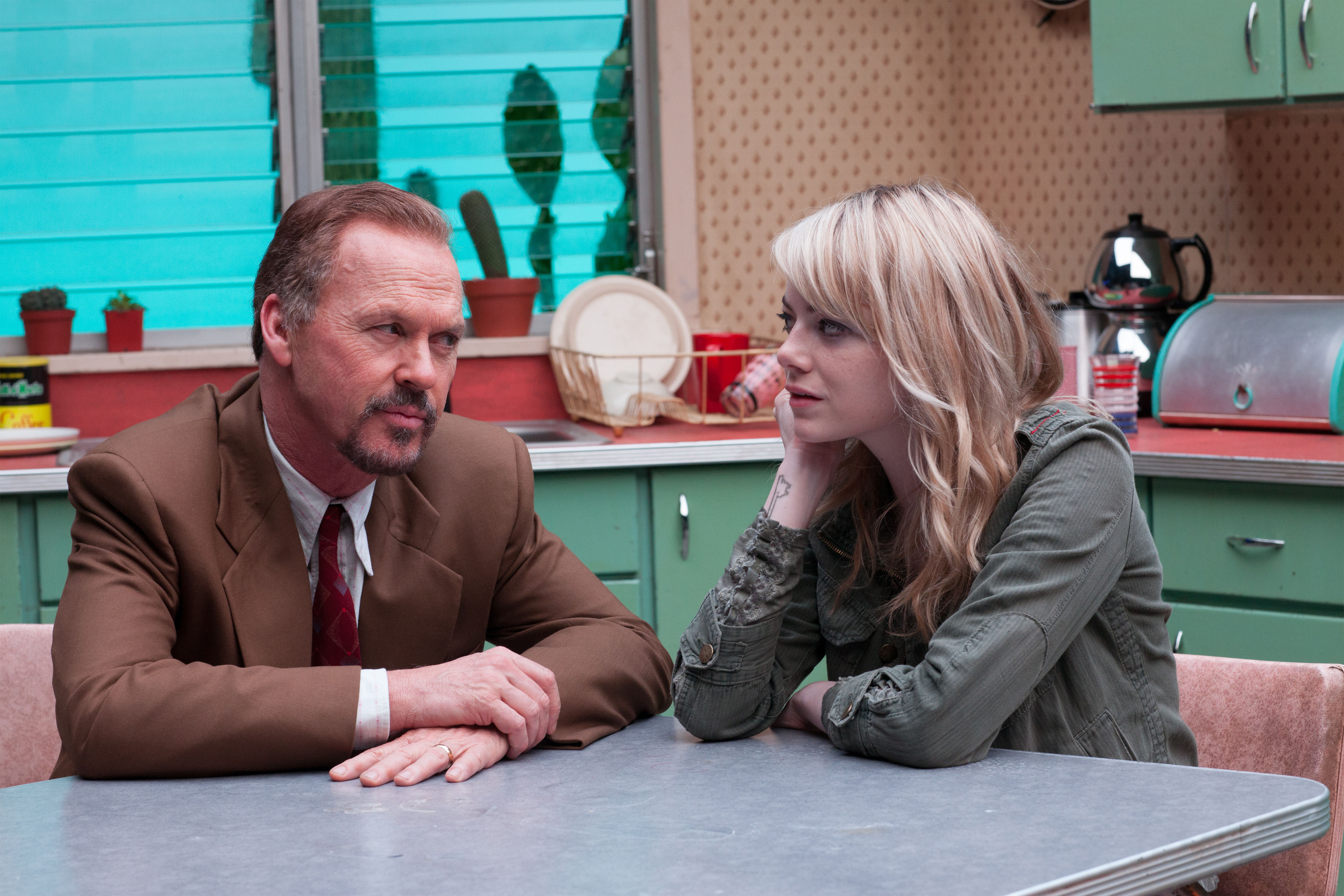Directed by Alejandro González Iñárritu,Birdman is the story of a fading star’s search for professional rehabilitation and personal redemption that perches adroitly between dark humour and darker despair and injects a familiar story of mid-life crisis with fresh vitality and emotion thanks to vivid flights of an intensely cinematic fancy.
Michael Keaton, a leading man in light comedies before rising to the big leagues by playing Batman in the Tim Burton original and first sequel, has been cast for maximum meta-value as Riggan Thomson, an actor who found fame by playing Birdman, the superhero of an eponymous film franchise. Riggan is now seeking to resurrect both his career and artistic credibility by writing, directing, and starring in a stage version of Raymond Carver’s What We Talk About When We Talk About Love on Broadway.
As well as putting everything on the line creatively, Riggan has to manage personal and professional complications arising from clashes with his co-star, an intense, Sean Penn-like Method devoté played by Edward Norton (giving rise to a hilarious Fight Club nod in another meta-joke), an unwise affair with the show’s needy ingénue (Andrea Riseborough), and the appearance of his estranged, semi-rehabbed daughter (Emma Stone pictured, below right, like Keaton giving a career-best performance). The backstage saga is imbued with understanding of and affection for actors and their combination of wild egomania and profound insecurity.
 But primarily Riggan has to battle himself, or the aspect personified by his filmic alter ego, who periodically turns up to suggest he’s going to make a fool of himself with all this highbrow stuff and should return to the safety of the mainstream. And Birdman also represents the self-absorbed, insensitive, career-driven side of Riggan that has undermined his marriage and his relationship with his daughter. Ironically, it is this persona that is dragging him down, preventing him from breaking free from old self-destructive patterns and soaring to new heights.
But primarily Riggan has to battle himself, or the aspect personified by his filmic alter ego, who periodically turns up to suggest he’s going to make a fool of himself with all this highbrow stuff and should return to the safety of the mainstream. And Birdman also represents the self-absorbed, insensitive, career-driven side of Riggan that has undermined his marriage and his relationship with his daughter. Ironically, it is this persona that is dragging him down, preventing him from breaking free from old self-destructive patterns and soaring to new heights.
Even more than the Birdman, another entity hovers over the film – the spirit of Robert Altman. Like Altman (who directed Short Cuts, constructed from inter-leaved Carver short stories), Iñárritu has a fondness for creating films with multi-stranded narratives. And remember the epic, masterful tracking shot that kicked off The Player, Altman’s dark satire of Hollywood? All of Iñárritu’s dark satire of Hollywood looks like one epic, masterful tracking shot as the camera swoops and glides backstage, onstage, and outside the theatre to Times Square and the surrounding streets.
Birdman also evokes Bernard Rose’s lesser-known but wonderful Ivansxtc, in which a Hollywood player in extremis reconsiders his priorities to the strains of Wagner, as Riggan does to the strains of Mahler, when not engaged in conflicts accompanied by a driving solo jazz drummer (you wait years for a film with a solo jazz drum score and then two – this and Whiplash – come along at once).
A moving, exhilarating ride into the depths of the soul and up through the empyrean of the imagination
However – and I say this with trepidation, given the excoriating attack on critics Riggan delivers to Lindsay Duncan’s pinch-faced bluestocking of a New York Times reviewer, a creature so friendless and misanthropic she is always pictured scribbling alone at a bar – the ending is problematic, at least for anyone with a low tolerance for magical realism. There are elements of magic realism right from the start (for example, Riggan’s ability to move objects telekinetically), but it’s entirely possible his superhuman powers exist solely in his mind. But then in the final scene we are asked, I feel, to accept their objective reality, though I know others who think Riggan’s final action is only figuratively rather than literally true.
As well, Iñárritu lets several important plot dynamics just drop. I’m not saying they need to be tied up with a neat bow, but we shouldn’t feel he’s forgotten about the characters and it made me wonder if he likes multi-stranded narratives because he doesn’t really do wrapping up subplots. But for most of the time, Birdman is a moving, exhilarating ride into the depths of the soul and up through the empyrean of the imagination.
Overleaf: watch the trailer for Birdman















Add comment